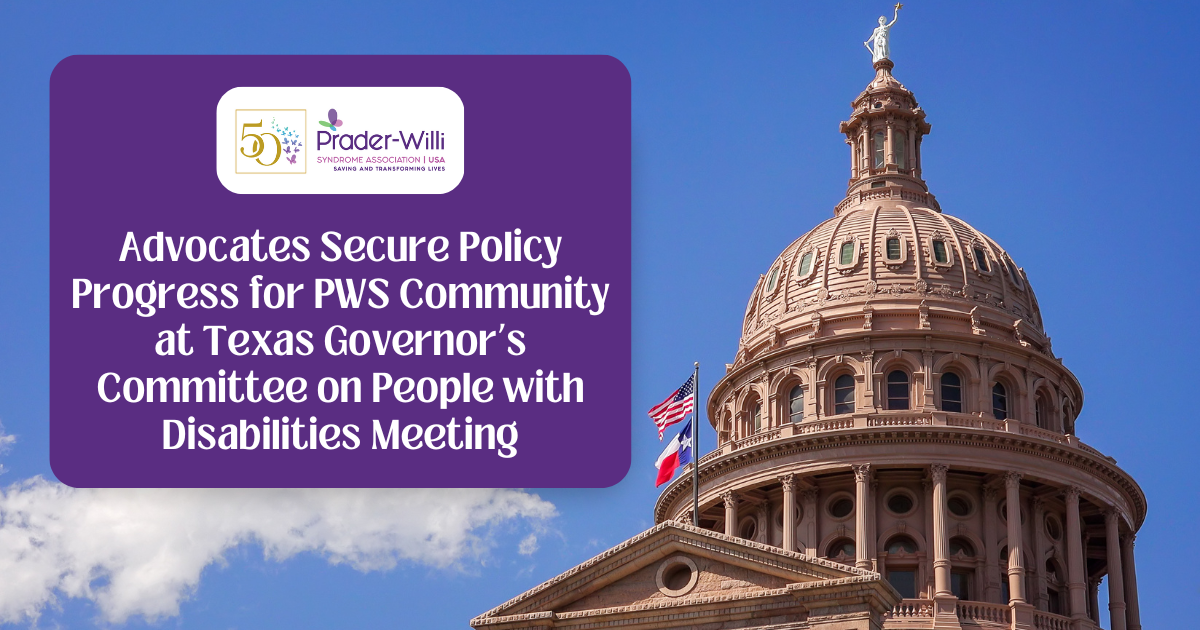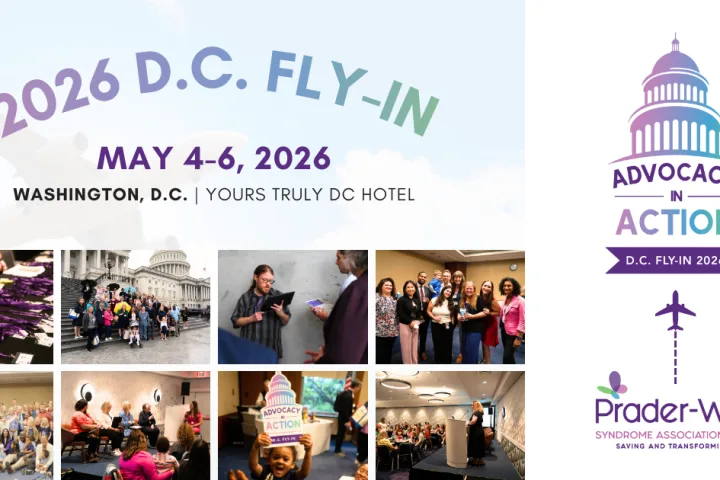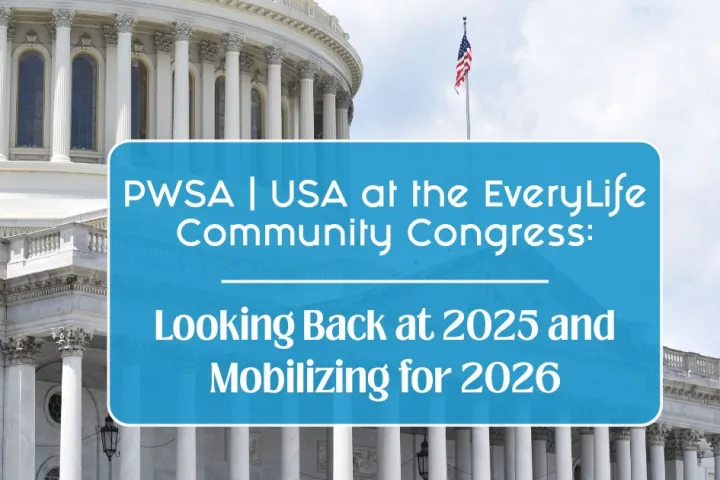On Friday, January 24, 2025, the Texas Prader-Willi syndrome (PWS) community achieved a significant milestone during the Texas Governor’s Committee on People with Disabilities meeting. Our dedicated advocates Tim Joniec and June Finnerty testified on behalf of individuals living with PWS in Texas, shedding light on critical unmet needs and proposing policy changes to better support this high-risk population.
Key Highlights
Overview of PWS:
Tim and June provided an in-depth explanation of PWS, emphasizing its life-threatening and complex nature. As a spectrum disorder, PWS affects individuals differently, with IQs ranging widely. They highlighted a critical risk: individuals with higher IQs are often at greater danger because their cognitive abilities enable them to bypass food security measures, which can result in catastrophic outcomes.
Policy Request:
The advocates proposed creating an IQ carve-out for individuals with PWS in Texas waiver programs. They explained that IQ is an inadequate measure of disability for PWS. While the current threshold of 75 offers some flexibility, many individuals with PWS still fall outside this range despite facing severe risks. The proposed exemption would ensure access to necessary care and services for this vulnerable population.
Significance:
Without constant supervision and structured interventions, individuals with PWS face life-threatening medical consequences, including death from uncontrolled food consumption. The advocates underscored the urgency of removing IQ-based requirements to protect individuals with PWS and provide the support they need.
Outcome
The Texas committee responded positively, with nearly unanimous support for the proposed policy changes—only one abstention was recorded. This outcome marks a critical step forward in recognizing PWS as a unique and complex disorder requiring tailored policies. The committee also expressed interest in supporting future initiatives to address the broader needs of the PWS community in Texas. We will continue to share details on the progress of this policy change.
Celebrating Advocacy in Action
We extend our heartfelt congratulations to Tim Joniec, June Finnerty, and the entire PWS community for this groundbreaking progress. Their compelling testimony and unwavering advocacy have paved the way for meaningful policy changes that will improve the quality of life for individuals living with PWS in Texas.
If you are interested in advocating for PWS, we encourage you to reach out to Advocacy@pwsausa.org. Together, we can fight to ensure the safety, dignity, and well-being of everyone affected by Prader-Willi syndrome.
Share this!





 Perry A. Zirkel has written more than 1,500 publications on various aspects of school law, with an emphasis on legal issues in special education. He writes a regular column for NAESP’s Principal magazine and NASP’s Communiqué newsletter, and he did so previously for Phi Delta Kappan and Teaching Exceptional Children.
Perry A. Zirkel has written more than 1,500 publications on various aspects of school law, with an emphasis on legal issues in special education. He writes a regular column for NAESP’s Principal magazine and NASP’s Communiqué newsletter, and he did so previously for Phi Delta Kappan and Teaching Exceptional Children. Jennifer Bolander has been serving as a Special Education Specialist for PWSA (USA) since October of 2015. She is a graduate of John Carroll University and lives in Ohio with her husband Brad and daughters Kate (17), and Sophia (13) who was born with PWS.
Jennifer Bolander has been serving as a Special Education Specialist for PWSA (USA) since October of 2015. She is a graduate of John Carroll University and lives in Ohio with her husband Brad and daughters Kate (17), and Sophia (13) who was born with PWS. Dr. Amy McTighe is the PWS Program Manager and Inpatient Teacher at the Center for Prader-Willi Syndrome at the Children’s Institute of Pittsburgh. She graduated from Duquesne University receiving her Bachelor’s and Master’s degree in Education with a focus on elementary education, special education, and language arts.
Dr. Amy McTighe is the PWS Program Manager and Inpatient Teacher at the Center for Prader-Willi Syndrome at the Children’s Institute of Pittsburgh. She graduated from Duquesne University receiving her Bachelor’s and Master’s degree in Education with a focus on elementary education, special education, and language arts. Evan has worked with the Prader-Willi Syndrome Association (USA) since 2007 primarily as a Crisis Intervention and Family Support Counselor. Evans works with parents and schools to foster strong collaborative relationships and appropriate educational environments for students with PWS.
Evan has worked with the Prader-Willi Syndrome Association (USA) since 2007 primarily as a Crisis Intervention and Family Support Counselor. Evans works with parents and schools to foster strong collaborative relationships and appropriate educational environments for students with PWS. Staci Zimmerman works for Prader-Willi Syndrome Association of Colorado as an Individualized Education Program (IEP) consultant. Staci collaborates with the PWS multi-disciplinary clinic at the Children’s Hospital in Denver supporting families and school districts around the United States with their child’s Individual Educational Plan.
Staci Zimmerman works for Prader-Willi Syndrome Association of Colorado as an Individualized Education Program (IEP) consultant. Staci collaborates with the PWS multi-disciplinary clinic at the Children’s Hospital in Denver supporting families and school districts around the United States with their child’s Individual Educational Plan. Founded in 2001, SDLC is a non-profit legal services organization dedicated to protecting and advancing the legal rights of people with disabilities throughout the South. It partners with the Southern Poverty Law Center, Protection and Advocacy (P&A) programs, Legal Services Corporations (LSC) and disability organizations on major, systemic disability rights issues involving the Individuals with Disabilities Education Act (IDEA), Americans with Disabilities Act (ADA), and the federal Medicaid Act. Recently in November 2014, Jim retired.
Founded in 2001, SDLC is a non-profit legal services organization dedicated to protecting and advancing the legal rights of people with disabilities throughout the South. It partners with the Southern Poverty Law Center, Protection and Advocacy (P&A) programs, Legal Services Corporations (LSC) and disability organizations on major, systemic disability rights issues involving the Individuals with Disabilities Education Act (IDEA), Americans with Disabilities Act (ADA), and the federal Medicaid Act. Recently in November 2014, Jim retired.